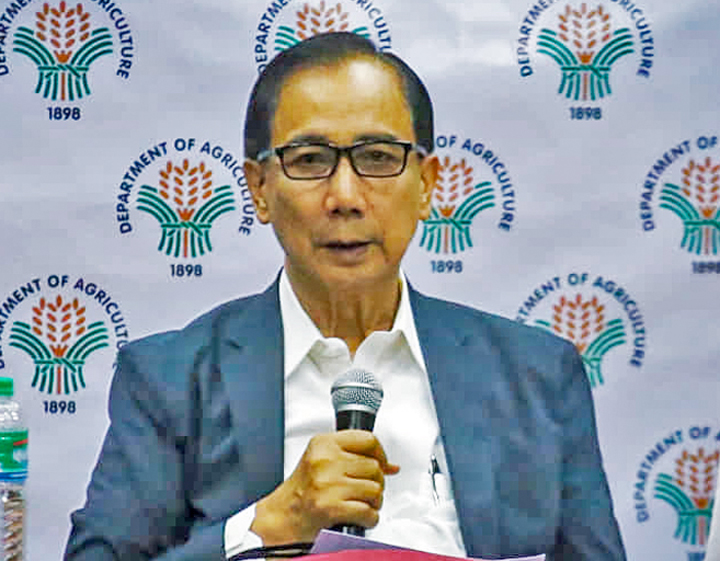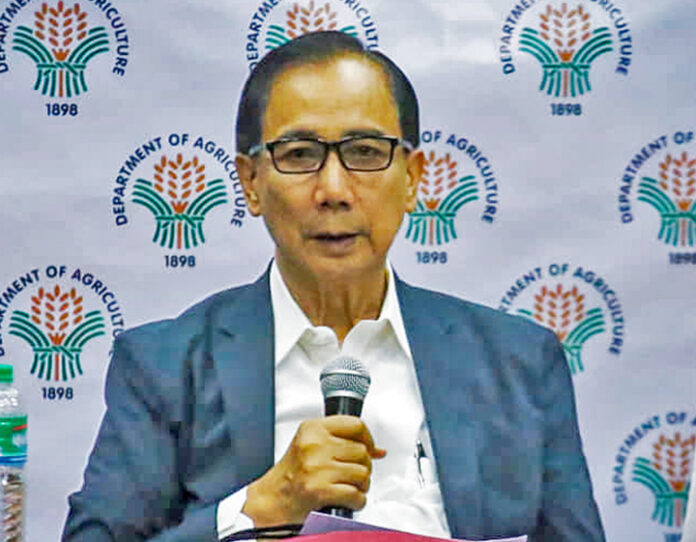
AGRICULTURE Secretary William D. Dar said on Wednesday they are mulling over reforms in the country’s minimum access volume (MAV) system and are seeking a unitary tariff rate for in-quota and out-quota imports of concerned agricultural products.
Dar confirmed to the BusinessMirror that reforms concerning the country’s MAV system are on the way to “streamline import procedures.”
Dar said they are looking to remove the current MAV licensing requirements and implement a “first come, first serve” policy on availing the existing quotas for certain agricultural imports.
Dar also disclosed that the Department of Agriculture (DA) will request the assistance of the Cabinet-level interagency Committee on Tariff and Related Matters (CTRM) in coming up with a unitary rate for agricultural commodities that have existing MAVs.
“The removal of MAV licensing requirements will streamline processes and ensure actual availment by MAV importers based on a ‘first to arrive’ principle,” he said via SMS.
“We will request CTRM to assist in the unification of in-quota and out-quota tariffs inasmuch as there are now a few products that have unified rates,” he added.
MAV is a commitment made by countries like the Philippines to the WTO to facilitate trade between countries by ensuring a guaranteed minimum volume of imports to enter their respective domestic markets at a lower tariff.
The MAV is implemented in the form of tariff rate quotas, wherein imports within the quota (in-quota) are slapped with lower tariffs compared to out-quota volume.
At present the MAVs for agricultural products are allocated among eligible importers, firms and companies based on their past MAV performances. Quota holders are also required to secure a MAV license.
Dominguez letter
FINANCE Secretary Carlos G. Dominguez III earlier revealed that the Economic Development Cluster (EDC), which he chairs, has instructed the DA and the Department of Trade and Industry to “work towards” the “removal of the MAV system,” replacing it with an appropriate tariff rate to regulate agricultural imports. (Related story: https://businessmirror.com.ph/2021/04/21/dominguez-tariff-mav-options-were-suggested-by-edc/)
The instruction came after the EDC identified that “government tariffs, low MAV quotas and non-tariff barriers to trade” were factors to the spike in prices of key food commodities, contributing to higher inflation rate.
“Likewise, the EDC requested agencies to undertake administrative measures to reduce barriers to importation,” Dominguez said in his letter dated April 20 to Senate President Vicente Sotto III, a copy of which was obtained by the BusinessMirror.
Certain agricultural products with existing MAVs have two-tier tariffs such as pork; here, in-quota imports are levied with 30-percent tariff while out-quota volume has a 40-percent tariff.
However, certain agricultural products that have MAVs have achieved unified in-quota and out-quota tariff rates today due to commitments made by the Philippines to the WTO.
The products with MAV that already have uniform in-quota and out-quota tariffs are: chicken, frozen or chilled (40 percent); turkey livers, frozen or chilled (40 percent); potatoes, fresh and chilled (40 percent); and roasted coffee beans (40 percent).
The United States’s International Trade Administration noted that the Philippines in-quota and out-quota tariff rates for agricultural products “averaged 36.5 percent and 41.2 percent, respectively, and have not changed since 2005.”
Abolition call
INDUSTRY groups like the United Broiler Raisers Association (Ubra) have long pushed for the abolition of the MAV system after the in-quota and out-quota tariff rates for poultry imports reached parity in 2005 at 40 percent.
Monetary Board Member V. Bruce J. Tolentino pointed out that the MAV system is now “obsolete” as it is “no longer a significant aspect of WTO agreements.”
“It is up to each country to set tariffs according to its best interest,” Tolentino told the BusinessMirror.
“The quotas are part of the MAV system and should also be abolished. In general, tariffs should be relatively low and uniform. Competitiveness is a matter of productivity, not tariff barriers,” Tolentino added.
Industry experts told the BusinessMirror that having a uniform tariff for imported goods could curb technical smuggling as it removes the “incentive to misdeclare,” unlike in a two-tier tariff regime.
Read full article on BusinessMirror

